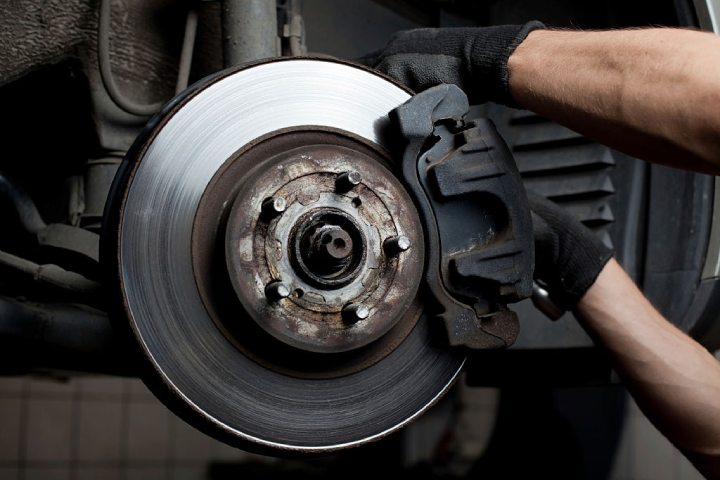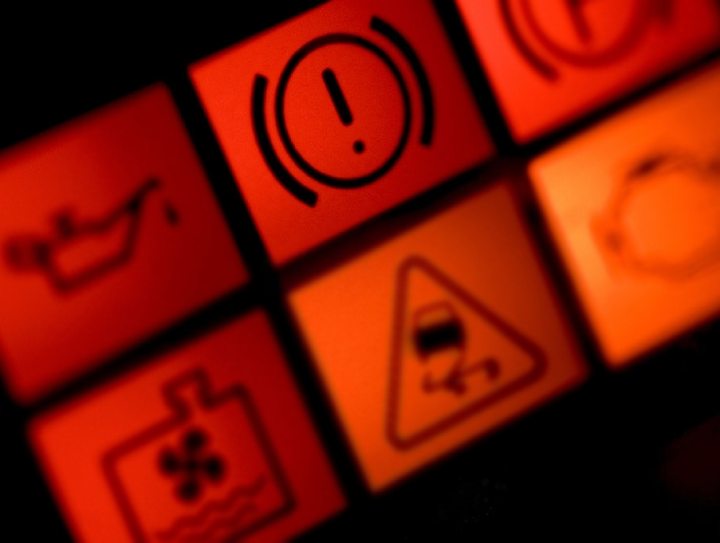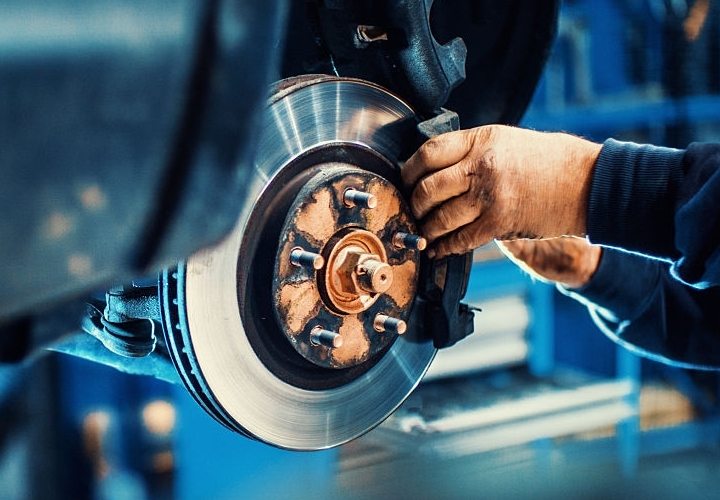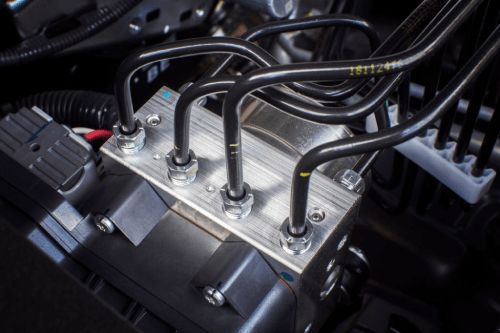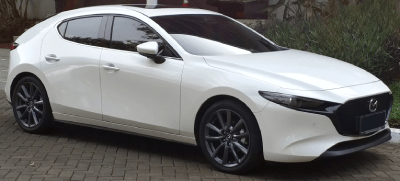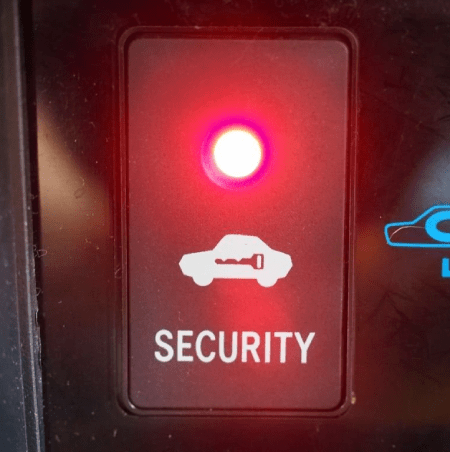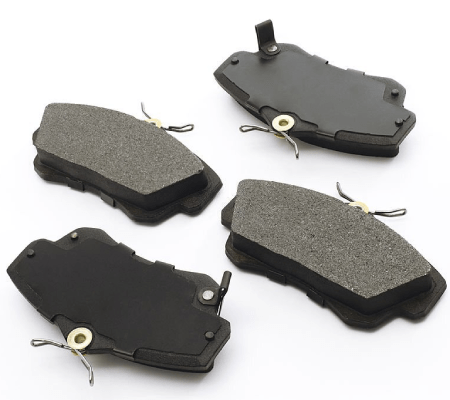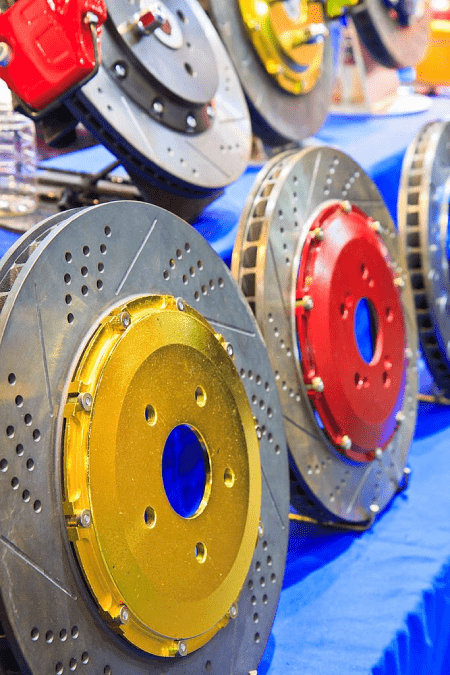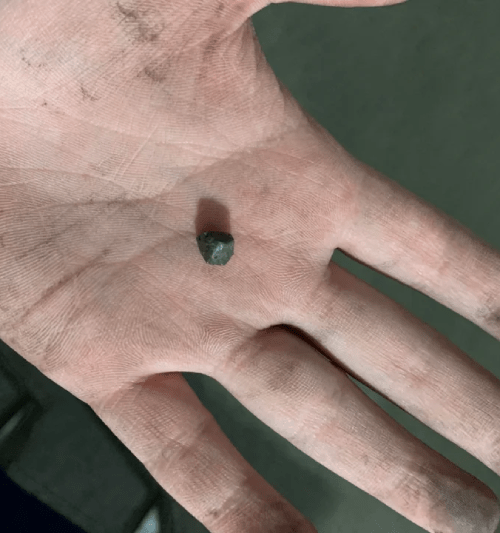Do you hear a squeaking noise from your brakes, even with your foot off the brake pedal? This is a common problem often caused by worn-out brake pads and other components in the braking system.
The squeaking noise tells you it’s time to check your brakes, but there can be more to it. The braking system is made of many mechanical components that could be responsible for the same noise. You should, however, never ignore the sound.
If you can hear a squeaking noise while driving but not using the brakes, it might indicate a rock stuck in your brakes, a sticky caliper or a bent splash plate hitting the brake disc.
Read for detailed information about the causes of the squeaking noise coming from your brakes. We will also cover what to do in such situations.
What Are the Possible Causes of Squeaking Noises When Not Using The Brakes?
Among the noises that can come from your brakes is squeaking. This can be due to many factors, which vary from one car model to the next and the driving conditions. But the most common causes include the following:
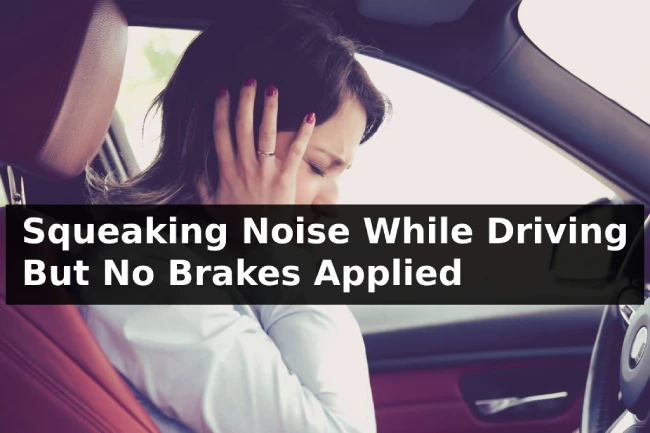
Brake Pads Indicator
A squeaking noise is the first sign that your brake pad material is worn out. The brake pads are designed with a metal indicator that produces a high-pitched squeaking noise when they get to their minimum thickness. It is to warn you when it’s time to replace the brake pads.
Brake pads are the most frequently replaced component of the brake time, which should be done on time. Unfortunately, that annoying screeching sound is the best way to inform you when to replace them. Driving with worn-out brake pads endangers you and other road users. You also risk damaging the disc rotors.
But the squeaking noise can also be caused by a thin layer of rust on the brake pads. If the noise persists after applying the brakes a few times, check the brake pads and possibly replace them. You can do this in your garage if you have the tools or take your car to an auto repair shop.
Bent Splash Plate/Guard
A bent splash plate or guard could easily be hitting the brake rotor when the car is moving, resulting in a squeaking noise, even though you do not hit the brake pedal. Someone with some skills and a heat gun could easily shape it back to its original form, or a replacement is a better idea if badly damaged.
Regardless of what you decide to do, fixing a bent splash guard is not an expensive repair; it should make the noise disappear.
Dust and Debris stuck in the Brakes
Dust, debris, stones, or other objects can get stuck between the brake pads and the disc rotor. This often happens when driving off-road or your car stays in a dusty place for a long time.
Squeaking noises from brakes caused by debris and foreign objects between the brakes is likely to disappear after applying the brakes a few times. But if it doesn’t go away, inspect the brakes. Stones or sticks may be stuck in between them and the disc rotor. Remove these foreign objects to do away with the squeaking noise.
Alternatively, spray the brakes with a cleaner or sand them to remove dust and debris. But it will solve the problem only if your brake pads are in good condition.
Hydraulic Failure in The Brake Caliper (Sticking Caliper)
Hydraulic failure can be caused by many factors. Regardless, if it happens in the brake calipers, the brake pads can rub against the disc rotors even when not stepping on the brake pedals. That can cause the squeaking noise or brake pad glazers.
You need a mechanic to help you examine the braking system and solve the problem. It can be costly to repair brake hydraulics but fix it for safety.
Below are some less common causes that could result in a squeaking noise when not braking, but they are still worth checking if you have checked everything so far and still have not figured out the noise source.
Poor Quality Brake Pad Material
You might think buying low-quality brake pads save you a few bucks, but the damage might be costly. The poor-quality brake pads may have metal chunks in the friction material. These will rub against the disc rotors, causing a grinding or squeaking noise. Just invest in high-quality brake pads to avoid running into this problem.
The same applies to metal brake pads. These can have organic, semi-metallic, or ceramic brake pad material. But which is the better option? The semi-metallic type is the most common and comprises iron, steel, graphite, and copper. When they rub against the disc rotors, they will produce the squeaking sound you hate.
Unfortunately, organic brake pad material wears out very fast, though they are more affordable and quieter. The best option is the ceramic brake pads, but you will spend more on these. They are the most silent and longest-lasting type, guaranteeing a noise-free ride.
Moisture on the Brakes
The time the squeaking noise starts can tell you the possible cause. If it is a moisture problem, you will likely notice the annoying noise in the morning when reversing from your garage or parking lot. This problem is rampant when the car stays overnight in the rain, snow, or high humidity.
Moisture causes the brake rotors to rust. The thin rust layer formed causes a grinding or squeaking noise when you apply the brakes. Fortunately, you have nothing to worry about since the problem will solve itself after you step on the brake pedal a few times. Once the rust layer on the disc rotors is worn out, the noise disappears.
Park your car in a moisture-free area to avoid getting this annoying squeaking sound when you drive off in the morning. Keeping it indoors in winter is preferred!
No Lubrication on the Brakes
If you just picked up your car from the mechanic when you get the squealing noise, the mechanic might have forgotten to lubricate the brake pins. It is also possible the mechanic did not spray the brake pads with an anti-seize after replacing the brake rotors.
Also, vehicles with rear drum brakes may produce a squeaking noise if the braking plates and other associated components are not well lubricated. The sound can also come from the sticky movement on the caliper piston.
The solution to this problem is lubrication. Take your vehicle back to the mechanic to lube all necessary braking components. The braking plate, rotor discs, brake pad contact points, and caliper piston require lubrication.
Braking Style
Your braking style can also make the brakes produce a squeaking noise. Repeated hard and fast braking at highway speeds generates excess heat, causing a hard glaze on the brake pads. That happens when the generated heat increases the temperature beyond what the brake pads were designed to handle.
Glazed brake pads generate a squeaking noise and lose their braking ability. Replace them as soon as you realize the problem.
Worn Out Rotor Discs
Worn-out rotor discs are a possible cause of squeaking noises from your wheels. An unevenly worn-out rotor disc creates scraping sounds and may send a lot of vibrations to the cabin. You can also feel these vibrations on the brake pedal when transmitted into the braking system.
What Are the Common Signs of Failing Brakes?
The squeaking noise from the brakes is a sure sign that your brake system needs service, but that is not all. Your brakes show other signs to alert you about impending danger. Take action immediately if you notice the following:
Leaking Brake Fluids
The braking system depends on the fluid pressure to push the brake material against the disc rotors to stop your car. Leaking fluid reduces that pressure, resulting in a loss of braking power. If your vehicle takes longer to stop than it used to, the fluid may be leaking.
Car Pulling to One Side When Braking
This results from uneven pressure on the wheels when braking. One or more brake calipers may be applying a lot of braking pressure when you step on the brake pedal, causing the unbalanced stopping. Take your car to a mechanic for diagnosis.
Burning Smell in the Cabin
If you notice your car produces a burning smell when braking, the brakes may fail at any time. It results from overheating of the components. This causes a lot of stress and increases the chances of failure.
The Dashboard Brake Light Comes On
Your car may alert you if there is a problem with the brake system by illuminating the brake light on the dashboard. Act immediately to avoid total brake failure that can cause a severe accident.
How To Fix Squeaking Brakes
The squeaking noise from your brake may disappear on itself. But if it persists, you should diagnose the problem. You can do that at home in your garage or take your car to the mechanic. Whichever the case, it will involve doing one of the following:
Lubricating the Brake System Components
You or the mechanic will apply brake grease to a squeaky brake to remove the noise. The lubricant is applied to the backside of the braking pad and brake caliper contact points.
Installing New Brake Pads
If the brake pads are worn out, replacing them is the quickest method to eliminate the squeaky sound from the brakes. Buy high-quality brake pads, preferably ones with ceramic brake pad material.
Adding brake pad shims can also remove the squeaky noise from your brakes. They have a rubber layer that absorbs judder that can cause the sound.
Changing Disc Rotors
Warped or damaged disc rotors can also make a squeaking sound. They cause uneven wearing of brake pad material and may affect the overall braking system. Replace them when changing brake pads.
Cost of Fixing or Repairing Squeaky Brakes
This varies from location to location and the component to be replaced. It can range from $120 to $680 per wheel axle, depending on the make and model of your car. But it can be even less if you only need to resurface the disc rotor instead of replacing it.
Replacing brake pads can cost about $300 in parts and labor per axle, and replacing a disc rotor ranges from $250 to $500. This is also per axle for labor and parts.
Brian is an auto technician who writes DIY repair articles and creates how-to videos for MechanicAsk. He focuses on common repairs like brakes, oil changes, and lighting. Brian draws on his 5 years of dealership experience to explain repairs in an easy-to-follow manner, even for novice do-it-yourselfers. His technical articles always include detailed tool lists, supply checklists, and visual guides.

